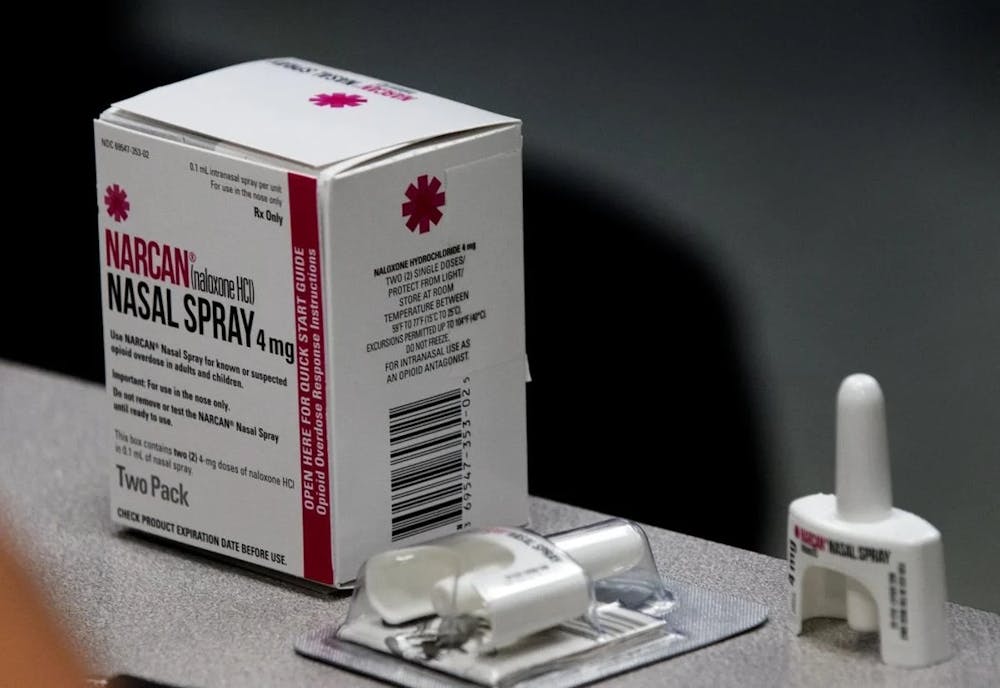As part of a larger, statewide, movement to make Naloxone and training to use it more accessible, IUPUI hosted free Narcan training in the Campus Center on Feb. 1.
Naloxone is a medication used to reverse opioid overdose to be used in emergency situations and not as a long-term solution to opioid addiction or abuse. Narcan is the nasal spray device used to administer naloxone.
With the rise of lethal drugs, such as fentanyl and xylazine, being laced into other substances, accessibility to proper overdose treatment has been an increasing concern for state officials. According to the Indiana State Department of Health, Indiana had the third highest drug overdose rate increase in the nation from 2016-2017, and according to an article by WFYI in 2021, 2,755 Indiana residents died from drug overdose, 85% of which were due to fentanyl.
According to WRTV, Indiana created an initiative to increase access to naloxone starting in 2021. The initiative provided 24/7 access to opioid rescue kits called NaloxBoxes. On Jan. 10 of this year, the IDS reported that IU Bloomington installed their first on-campus Naloxone box at the IU Student Health Center.
According to OverdoseLifeline, Naloxone Training, teaches how to recognize the signs of overdose, demonstrate how to administer naloxone, discuss the role of harm reduction in the overall opioid public health crisis solutions/action plan/strategy and list a minimum of three overdose prevention tips for people who use drugs.
According to Jeff Minor, an Outreach Specialist for the Marion County Health Department, these types of trainings are part of a larger, nation-wide movement against the opioid epidemic.
“We are wanting to combat the opioid epidemic that is not just present in the state of Indiana and in Indianapolis but across the country,” said Minor. “We are having so much unneeded death from things like fentanyl and prescription opioids because it can lead to respiratory failure, and in the worst cases death, if you don’t remedy the respiratory failure. Regardless of what politics are behind it, we are trying to save lives and combat the opioid epidemic.”
In addition to the national movement, Minor notes the impact Naloxone training has had on Marion county specifically.
“It saves lives. We have about two people a day dying in Marion county, which is the Indianapolis area, and they are dying from opioid overdoses,” he said. “Meaning that they have taken too much either by prescription or they use it illicitly and mostly from fentanyl.”
Minor goes on to explain how Narcan works, and how equipping people with it and the knowledge of how to use it can save lives. .
“Narcan works by displacing the opioids off the pain receptors so that breathing can resume. It is very important as a precaution and as a treatment,” Minor said. “I carry five with me, just in case my family, my friends, neighbors, my fellow citizens (have an overdose), I can use Narcan in combination with EMS (Emergency Medical Services) to save their life.”
While administering Narcan can save lives, many may not report the event due to fear of being arrested for possession or other drug-related charges. According to Minor, this should not be the case.
“Other students do use illegal drugs, so, if somebody does overdose, we can save their life,” Minor said. “A lot of times people don’t out of fear. They won’t call help because they think they are going to get in trouble. Many are not aware that in Marion county and in the state, if you administer Narcan and call for help, you are exempt from criminal prosecution from possession of controlled substances and/or drug paraphernalia.”
Under Aaron’s Law, signed in 2015, anyone who administers Narcan in the event of an overdose is protected under the law as long as they acted in “good faith.” It is similar to good Samaritan laws for emergency situations where someone might administer CPR.
Minor also warns about a new form of fentanyl that is especially deadly despite its deceiving size and appearance.
“What we are starting to see show up now is called the rainbow fentanyl,” Minor said. “They look like sweet tarts. It doesn’t take very much fentanyl to kill you. We are talking less than 2 mgs for your average adult, or if you want to put in everyday quantities, 11 grains of salt is enough to also kill you.”
According to Minor, the best things IUPUI students can do is be informed and aware.
“The first thing you do is be aware and find out how dangerous things are and don’t be so trusting,” Minor said. “Be careful what you put in your body. Raise your awareness of what it means to be healthy. You didn’t come to college to die, right. So they have to be very careful of what they put in their body.”
Abby Godsen is a reporter for the Campus Citizen studying Applied Information Sciences. When she isn't reporting, she is doing puzzles, drinking tea or reading a book.





